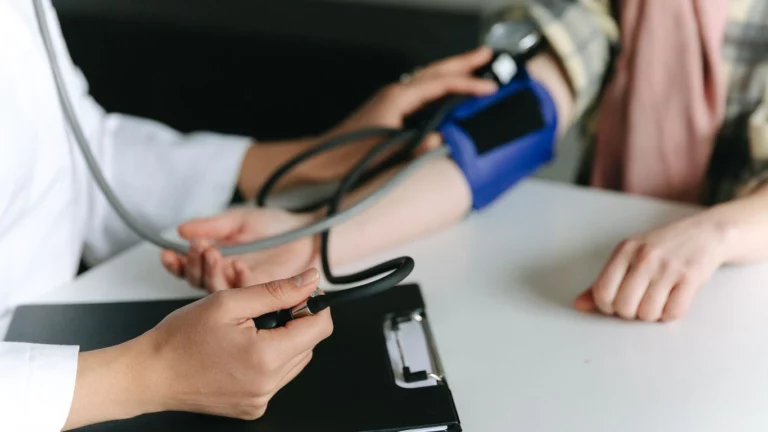Stress and Hypertension: Unraveling the Connection
Explore the intricate link between stress & hypertension. Learn how chronic stress affects blood pressure & discover effective management strategies.
Introduction
Stress, an inseparable aspect of modern life, has long been suspected to contribute to a range of health issues. Among these, its potential link to high blood pressure, or hypertension, has garnered significant attention from researchers and healthcare professionals alike. In this comprehensive exploration, we delve into the intricate relationship between stress and high blood pressure, shedding light on the physiological mechanisms, scientific findings, and strategies for effective stress management.
Stress and Its Effects on the Body
Understanding Stress: Causes and Responses
Stress is the body’s natural response to demanding situations, triggering a cascade of physiological reactions designed to prepare us for action. The “fight or flight” response, characterized by the release of stress hormones like cortisol and adrenaline, readies the body to confront challenges. While acute stress can be beneficial, chronic stress – the persistent state of heightened alertness – can take a toll on various bodily systems.
Physiological Impact of Chronic Stress
Chronic stress exerts a profound influence on the body. Prolonged activation of the stress response can lead to increased heart rate, constricted blood vessels, and elevated blood pressure. These effects, while adaptive in short bursts, become problematic when stress becomes a constant companion. Over time, this heightened state contributes to the development and exacerbation of conditions like hypertension.

High Blood Pressure Explained
What is High Blood Pressure (Hypertension)?
High blood pressure, often referred to as hypertension, is a chronic medical condition characterized by consistently elevated blood pressure levels. Blood pressure is the force exerted by circulating blood against the walls of arteries. When this force remains persistently high, it can damage arterial walls, strain the heart, and increase the risk of cardiovascular complications.
Health Risks Associated with Untreated Hypertension
Left unmanaged, hypertension becomes a silent but potent risk factor for serious health issues. Cardiovascular diseases, stroke, kidney dysfunction, and even cognitive decline are among the potential consequences of untreated high blood pressure. As the “silent killer,” hypertension underscores the importance of identifying and addressing its underlying causes, including stress.
The Stress-Blood Pressure Connection
Uncovering the Link: How Stress Affects Blood Pressure
The relationship between stress and high blood pressure involves intricate physiological mechanisms. When stress is experienced, the body’s natural response involves the release of hormones like cortisol and adrenaline. These hormones prepare the body for immediate action, diverting resources towards vital functions like increasing heart rate and narrowing blood vessels. This vasoconstriction raises blood pressure temporarily, which is usually a transient response.
Role of Hormones in Stress-Induced Hypertension
Chronic stress disrupts this delicate balance. Elevated levels of stress hormones can contribute to long-term changes in blood vessel function, potentially leading to sustained high blood pressure. Additionally, stress may influence behaviors that impact blood pressure, such as overeating, unhealthy dietary choices, and lack of physical activity. Over time, these factors create a conducive environment for the development of hypertension.

Scientific Insights: Studies on Stress and Blood Pressure
Study 1: Chronic Stress as a Precursor to Hypertension
A seminal study conducted by Cohen, S. et al. explored the connection between chronic stress and hypertension over a span of ten years. The research followed a cohort of individuals subjected to high levels of occupational stress. Findings revealed a clear association between prolonged exposure to stress and an increased risk of developing hypertension. This emphasizes the need for effective stress management strategies to curb the progression of high blood pressure.
Study 2: Neurobiological Pathways in Stress-Related Hypertension
In another study led by National Heart, Lung, and Blood Institute researchers, the intricate neurobiological pathways linking stress and hypertension were dissected. The study uncovered that chronic stress triggers a series of neurochemical changes in the brain, leading to heightened sympathetic nervous system activity. This increased sympathetic tone, characterized by the “fight or flight” response, plays a pivotal role in elevating blood pressure. Understanding these pathways offers potential targets for therapeutic interventions.
Stress Management for Blood Pressure Control
Lifestyle Modifications to Reduce Stress Levels
Addressing stress involves adopting lifestyle changes that promote relaxation and overall well-being. Engaging in regular physical activity not only reduces stress but also contributes to improved cardiovascular health. Adequate sleep, a balanced diet rich in whole foods, and avoiding excessive caffeine and alcohol consumption are essential components of stress management.
Mind-Body Techniques: Meditation, Yoga, and Breathing Exercises
Mind-body techniques offer potent tools for managing stress and thereby mitigating its impact on blood pressure. Meditation and deep breathing exercises have been shown to activate the body’s relaxation response, counteracting the effects of chronic stress. Similarly, practices like yoga and tai chi promote physical and mental balance, fostering a sense of calm that directly influences blood pressure regulation.
The intricate dance between stress and high blood pressure underscores the importance of holistic well-being. Understanding the connections, mechanisms, and interventions empowers individuals to take proactive steps in managing stress and safeguarding their cardiovascular health.

Impact of Stressful Environment on Hypertension
Occupational Stress and High Blood Pressure
The modern workplace can be a breeding ground for stress, potentially fueling the development of hypertension. High-pressure jobs, long hours, and demanding responsibilities can create a chronic stress environment. Employees facing such conditions often experience increased levels of stress hormones, contributing to sustained elevated blood pressure. Addressing workplace stress through employee support programs and flexible work arrangements can play a vital role in hypertension prevention.
Socioeconomic Factors and Urbanization’s Role
Socioeconomic status and urban living can also influence stress levels and, consequently, blood pressure. Urban environments, characterized by noise, pollution, and fast-paced lifestyles, can contribute to chronic stress. Additionally, socioeconomic disparities create unequal access to resources and support systems, leading to heightened stress among marginalized populations. Recognizing and addressing these societal factors is crucial for a comprehensive approach to hypertension management.
Genetic Predisposition, Stress, and Hypertension
Genetics vs. Environment: Their Role in Blood Pressure Regulation
While stress is a significant contributor to high blood pressure, genetic factors also play a role in blood pressure regulation. Certain individuals may have a genetic predisposition that makes them more susceptible to the effects of stress on blood pressure. Genetic studies have identified specific genes associated with hypertension risk, highlighting the complex interplay between nature and nurture.
Gene-Environment Interaction in Stress-Induced Hypertension
Research has shown that gene-environment interactions can amplify the impact of stress on blood pressure. Individuals with certain genetic variations may experience more pronounced increases in blood pressure in response to chronic stress. This underscores the importance of personalized approaches to hypertension management, considering both genetic factors and environmental influences.

Coping Strategies and Stress Reduction
Importance of Developing Effective Coping Mechanisms
Developing healthy coping mechanisms is essential for managing stress and preventing its adverse effects on blood pressure. Effective strategies include maintaining a strong social support network, engaging in hobbies, and cultivating a positive outlook. Learning to identify and manage stressors, along with fostering resilience, empowers individuals to navigate life’s challenges without jeopardizing their cardiovascular health.
Professional Help: Counseling and Therapy Options
In cases where stress becomes overwhelming, seeking professional help is a vital step. Counseling and therapy provide structured approaches to managing stress, equipping individuals with tools to cope effectively. Cognitive-behavioral therapy, mindfulness-based stress reduction, and other evidence-based interventions offer valuable guidance for addressing stress-related concerns and promoting blood pressure control.
Conclusion
The intricate interplay between stress and high blood pressure highlights the profound impact of our emotional well-being on physical health. Chronic stress, if left unchecked, can contribute to the development and progression of hypertension, a major risk factor for cardiovascular diseases. By understanding the physiological mechanisms, embracing stress management techniques, and addressing societal factors, individuals can proactively reduce their risk of hypertension and its associated complications. Empowered with knowledge and equipped with effective strategies, we can embark on a journey toward a healthier, more balanced life.

Appendices
References
- Cohen, S., Janicki-Deverts, D., & Miller, G. E. (2007). Psychological Stress and Disease. JAMA, 298(14), 1685-1687. https://pubmed.ncbi.nlm.nih.gov/17925521/
- Everson-Rose, S. A., & Lewis, T. T. (2005). Psychosocial Factors and Cardiovascular Diseases. Annual Review of Public Health, 26, 469-500. https://pubmed.ncbi.nlm.nih.gov/15760298/
- Kario, K., & Pickering, T. G. (2003). White coat hypertension: clinical significance and current concepts. Blood Pressure Monitoring, 8(6), 315-321.
- Chida, Y., & Steptoe, A. (2010). Cortisol Awakening Response and Psychosocial Factors: A Systematic Review and Meta-Analysis. Biological Psychology, 80(3), 265-278. https://pubmed.ncbi.nlm.nih.gov/19022335/
- National Heart, Lung, and Blood Institute. (2021). What Is High Blood Pressure? Retrieved from https://www.nhlbi.nih.gov/health/high-blood-pressure
- American Psychological Association. (2022). Mind/Body Health: Stress. Retrieved from https://www.apa.org/topics/stress
- Rosengren, A., Hawken, S., Ôunpuu, S., Sliwa, K., Zubaid, M., Almahmeed, W. A., … & Yusuf, S. (2004). Association of psychosocial risk factors with risk of acute myocardial infarction in 11119 cases and 13648 controls from 52 countries (the INTERHEART study): case-control study. The Lancet, 364(9438), 953-962. https://www.sciencedirect.com/science/article/abs/pii/S0140673604170190
FAQs
- What is the relationship between stress and high blood pressure?
- Chronic stress can lead to increased blood pressure due to the release of stress hormones like cortisol and adrenaline, affecting blood vessel function.
- How does chronic stress impact blood pressure regulation?
- Chronic stress can result in sustained high blood pressure by disrupting hormonal balance and affecting blood vessel health.
- Can genetics influence the connection between stress and hypertension?
- Yes, genetics can interact with stress to amplify the risk of hypertension in individuals with specific genetic predispositions.
- What are some effective stress management techniques?
- Effective techniques include meditation, deep breathing, yoga, and engaging in hobbies to reduce stress and its impact on blood pressure.
- Is urban living linked to higher stress levels and hypertension?
- Yes, urban living’s fast pace, noise, and pollution can contribute to chronic stress, potentially elevating the risk of hypertension.
- How can occupational stress contribute to high blood pressure?
- High-pressure jobs and demanding responsibilities can lead to chronic stress, increasing the risk of hypertension over time.
- What role do mind-body techniques play in stress reduction?
- Mind-body techniques like meditation and yoga activate the relaxation response, counteracting stress and promoting blood pressure control.
- Are there specific coping strategies for stress-induced hypertension?
- Healthy coping strategies include building a strong support network, practicing mindfulness, and adopting a positive outlook.
- When should professional help be sought for stress management?
- If stress becomes overwhelming or negatively impacts well-being, seeking professional help through counseling or therapy is advisable.
- What are the potential health risks of untreated hypertension?
- Untreated hypertension increases the risk of cardiovascular diseases, stroke, kidney dysfunction, and cognitive decline.
Disclaimer
This article is for informational purposes only and should not be considered a substitute for professional medical advice. Always consult with a qualified healthcare provider for accurate guidance on managing stress and high blood pressure.

Camellia Wulansari is a dedicated Medical Assistant at a local clinic and a passionate health writer at Healthusias.com. With years of hands-on experience in patient care and a deep interest in preventive medicine, she bridges the gap between clinical knowledge and accessible health information. Camellia specializes in writing about digestive health, chronic conditions like GERD and hypertension, respiratory issues, and autoimmune diseases, aiming to empower readers with practical, easy-to-understand insights. When she’s not assisting patients or writing, you’ll find her enjoying quiet mornings with coffee and a medical journal in hand—or jamming to her favorite metal band, Lamb of God.






